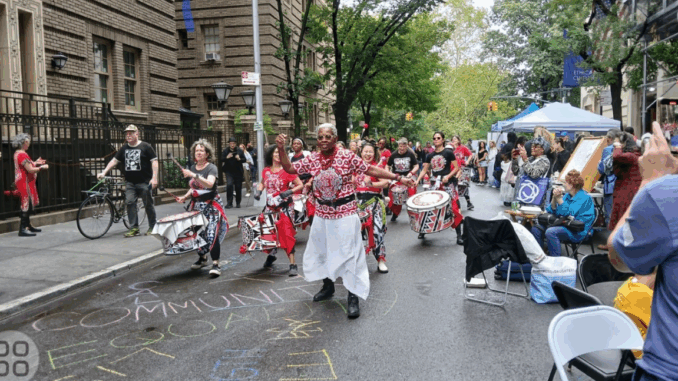
BY ROSSI SEALEY
Rain couldn’t dampen the spirit of the first-ever Ethical Cultural Street Fair last Sunday at West 64th Street, where a mix of non-profits organizations, ethical vendors, international cuisine, children’s activities, and music and dance performances filled the streets and the New York Society for Ethical Culture’s Adler Hall.
The event celebrated the 150th anniversary of the New York Society for Ethical Culture (NYSEC) by highlighting its commitment to community engagement and social responsibility. “Usually you don’t find nonprofits at street fairs, it’s usually arts and crafts,” said Marlene Williamson, Outreach Coordinator, who was responsible for the idea of the street fair.
Audrey Kindred, who runs NYSEC’s Ethical Education programs for children and families, notes that the invitation to the partnerships was to ask them to try to activate their non-profit organizations in some way that could engage the public.
Dr. Felix Adler founded the NYSEC in 1876. Adler created a movement that emphasized ethical principles through good, moral, and humane actions separated from religion and focused on education.
The members of the society have followed these principles in pursuit of this lifestyle. In 1877, the society initiated big projects, including the establishment of the District Nursing Service, a precursor of the Visiting Nurse Service, and founding the first free kindergarten. Throughout the years, the society worked to improve tenement housing. Adler founded a children’s clinic that is now a hospital. The society staffed community spaces like libraries, clubs, classes, and more.
In recent years, the society has continued Adler’s legacy of helping the community through the means of ethical living and social justice. According to the NYSEC website, “We host hundreds of community programs every year, with advocacy, social justice and education still at the forefront of our work. We hold forums on key social issues, and discussions on ethics and philosophy.”
The NYSEC holds these meetings, activities, events and services on Sundays in its historic meeting house.
“Our mission is to support social justice across the board, whether it is LGBTQ, Black lives, immigrants, and today we are strongly continuing with that mission.”
Alina Bloomgarden founded Music on the Inside (MOTI), a non-profit organization that works to change the lives of the community through music.
MOTI empowers youth and adults impacted by incarceration by pairing them with professional musicians who serve as teachers and mentors. As Zsofia Harai, Executive Administrative Assistant of MOTI, explains, “We provide music group classes for people currently incarcerated and one-on-one mentorships for people formerly incarcerated.”
According to the MOTI website, “clients develop positive self-expression as well as focus, concentration, patience, and a sense of parity with others. All of society benefits when these individuals have support for new and better choices.”
Harai notes that this organization ties towards ethics as it helps incarcerated individuals feel hope after being released. “It’s really jarring for people when they get released,” said Harai. “Since you haven’t been in control of your life for decades, incarcerated and being told what to do every second.”
MOTI has provided music education for 300 individuals and has reach more than 800 incarcerated people with prison concerts.
Dawud Rahman, a formerly incarcerated mentee, showcased his talents as a saxophonist and flutist at the street fair, where he worked with MOTI. Rahman, who was in prison for 46 years, recounts that he connected with MOTI through the Fortune Society organization’s open mic program. “The love for music was always there,” said Rahman.
Rahman joined a one-on-one mentoring program with professional saxophonist Don Braden and Juilliard flutist Barbara Siesel. “I’m very much thankful for the founder and many of the workers who provide benefits to those incarcerated and have a music interest,” said Rahman.
To attract a crowd, NYSEC invited Fallou Wadje, a drummer, fashion designer and an artist and Mamoudou Kinase Simbo another drummer. “It’s a beautiful thing that a drum is something authentic, original, and in Africa we use drums as communication,” Wadje said.
NYSEC also wanted to convey an environmental message. “We also believe very strongly in environmental causes,” said Williamson. “So that’s why there’s going to be a dance troupe called Time-Lapse Dance that will be doing a beautiful environmental dance.”
The Little Environmentalist Society is another non-profit organization that commits to caring for the earth by educating youth. “Our organization reaches out to little kids and teaches them how to protect and preserve the environment and prevent climate change,” said Stella Chouraki, hostess and event manager. “It is not something terribly difficult, but it makes a huge impact,” said Stella.” We are teaching kids how not to waste water, how to shop sustainably, and how to compost.”
NYSEC’s Kindred organized fairgoers to write messages in chalk on the street: “Peace,” “Love,” ‘Joy” and other messages in chalk. Kindred runs Sunday schools for children that are not about belief systems but about how goodness develops in human beings and other courses for kids. A new one is a Saturday 10-week course called Rooting for Humanity.
“Kids can sign up to learn about history and ancestry they’re rooted in and that ancestry is full of wonder, learning development, and to bring these amazing stories that can make those connections to little kids,” said Kindred.
Local leaders, including Assemblymember Linda Rosenthal, Councilmember Gale Brewer, Manhattan Borough President Mark Levine, and New York State Senator Brad Hoylman-Sigal, celebrated the NYSEC’s 150-year milestone.
“To be in the outdoors where every human-being is out in the public and could find us, whether an accident or not, feels good,” said Kindred.
